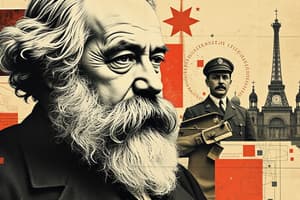Podcast
Questions and Answers
Who was Karl Marx?
Who was Karl Marx?
An economist, philosopher, and journalist who was concerned for workers experiencing poverty while wealth and power existed around them.
What type of theory is Marxism?
What type of theory is Marxism?
Macro conflict theory.
What are the two types of Marxisms?
What are the two types of Marxisms?
Humanistic or critical Marxism and scientific or structuralist Marxism.
What is a summary of Marxist theory?
What is a summary of Marxist theory?
How are societies characterized according to Marx?
How are societies characterized according to Marx?
How does the ruling class control the proletariat?
How does the ruling class control the proletariat?
What leads to class inequality according to Marx?
What leads to class inequality according to Marx?
What does the Communist Manifesto state about workers?
What does the Communist Manifesto state about workers?
How has Marxism influenced politics in Britain?
How has Marxism influenced politics in Britain?
What was the effect of Marxism on the Labour Party in 1945?
What was the effect of Marxism on the Labour Party in 1945?
Flashcards are hidden until you start studying
Study Notes
Karl Marx
- Karl Marx was an economist, philosopher, and journalist concerned with the plight of workers in poverty amidst wealth and power.
- He viewed capitalism as exploitative and detrimental to the working class due to industrialization's adverse impacts.
- Marx envisioned a classless society through revolutionary means.
Theory of Marxism
- Macro conflict theory contrasts with functionalism, emphasizing societal divisions between conflicting classes.
- Two primary classes in capitalism: the bourgeoisie (owners of wealth and property) and the proletariat (workers lacking property).
Perspectives of Marxism
- After Marx's death, two branches emerged due to the absence of a predicted classless revolution:
- Humanistic or Critical Marxism: Shares features with social action and interpretivist theories.
- Scientific or Structuralist Marxism: Aligned with positivist approaches.
Summary of Marxist Theory
- Society is class-based, primarily consisting of capitalists and proletariat.
- Conflict is inherent between these classes, with the state acting to control workers in capitalist society.
- A revolution is necessary for workers to overthrow capitalists when class consciousness is achieved.
- Post-revolution, a classless society will emerge, leading to the eventual dissolution of the state.
Characteristics of Societies According to Marx
- Societies can be characterized by:
- Means of production: includes land, factories, and machinery involved in producing goods.
- Relations of production: social relationships that develop around the production of goods, shaped by ownership dynamics.
Control of the Proletariat
- The bourgeoisie controls the proletariat through:
- Direct power exercise and indirect ideological manipulation.
- Ideology creates acceptance of social inequalities, justifying the wealthy's greed as acceptable behavior.
Class Inequality Due to Means of Production
- Ownership of the means and relations of production results in unequal social classes: a ruling class versus subject classes.
- Class position hinges on the relationship to means of production, with economic power equating to political power.
Communist Manifesto: Marx & Engels
- Exploitation of workers by capitalists highlighted poor wages and working conditions, leading to large capitalist profits.
- This unsustainable situation is predicted to incite a communist revolution, resulting in a classless society, deemed the final stage of history.
Marxism's Influence in British Politics
- Socialists assert that capitalism fosters inequality, concentrating wealth and power in an oligarchic few.
- Advocacy for an equitable society with access to wealth and power for all.
Labour Party's Response to Marxism
- The Labour Party’s 1945 election under Clement Attlee centered on a strong socialist agenda, aiming for transformative policies in the British state.
Studying That Suits You
Use AI to generate personalized quizzes and flashcards to suit your learning preferences.




